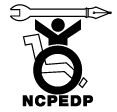National Centre for Promotion of Employment for Disabled People
![]() Disabled People Call for Political Recognition and Action
Disabled People Call for Political Recognition and Action
Issue Based Advocacy with Ministry
1. Ministry of Education
With India announcing its New Education Policy (NEP) after three decades, NCPEDP came out with a White Paper to examine the scope of inclusive education in light of the new policy and existing laws as well as the barriers that confront students with disabilities and provide recommendations for the same. To name a few, the White Paper revealed that:
- In 2018-19, only 29.47% of Indian schools enrolled children with disabilities, varying significantly between states.
- Schools for developmental disabilities, backed by the Ministry of Social Justice and Empowerment, often lack formal Board of Education affiliations.
- Transparency issues in state budgets hinder effective fund allocation for education.
- Disparities persist in funding allocation between schools (Rs. 59,845 crores, 2020-21) and higher education (Rs. 39,466 crores, 2020-21).
- The ongoing Covid-19 crisis raises worries about increased dropout rates among students with disabilities.
- Successful NEP implementation for students with disabilities is critical at both Central and State Levels.
2. Ministry of Home Affairs
With ambiguity looming around the upcoming 16th Census, the focus is on engagement with the Office of the Registrar General of India to:
- Include persons with disabilities at every stage, from planning to execution.
- Implement a comprehensive training module on disability questions, covering National Trainers, Master Trainers, Field Trainers, Supervisors, and Enumerators, with materials in sign language.
- Ensure mandatory compliance of digital tools with Web Content Accessibility Guidelines.
3. Ministry of Electronics and Information Technology
Making Websites GIGW Compliant
4. Ministry of Finance
5. Engagement with other Ministries
National Disaster Management Authority
The Covid-19 pandemic highlighted the vagaries faced by persons with disabilities, experiencing double the discrimination and exclusion compared to the others. Despite being a cross-cutting issue across gender, age, religion, geography, and economic background, disability remains largely invisible to the majority. As of November 28, 2021, according to Rajya Sabha Unstarred Question No. 257, 8,390 persons with disabilities received the first dose, and 4,018 received both doses of the Covid-19 vaccine through the Co-win portal. With Disaster Preparedness being the need of the hour, NCPEDP’s Core Group on Disaster needs to be sustained to create:
- Sensitize government authorities and stakeholders to disability issues.
- Establish partnerships with DPOs and civil society for pre and post-disaster mitigation.
- Advocate for the inclusion of State Disability Commissioners in the State Executive Committee on Disasters.
- Conduct extensive consultations with disability groups at the state level through the State Disaster Management Authority.
Awareness Creation
1. Capacity Building Workshops/Trainings
2. Disability Sensitization for Stakeholders (Govt. Agencies, Private and Public Bodies)
3. Awareness through Social Media Campaigns
4. Disability Law Units
5. Political Participation of Persons with Disabilities
6. Inclusive Health Insurance for Persons with Disabilities
Against this backdrop, NCPEDP in collaboration with NHRC and IRDAI organized a first of its kind Consultation on “Health insurance for Persons with Disabilities“. The consultation meeting was a well-timed supportive event in the process to document and share suggestive measures for inclusive & affordable policies. With participation from insurance providers and third-party administrators as well as key members from the National Committee on the Rights of Persons with Disabilities, the consultation helped understand the existing challenges faced by:
- Insurance providers while underwriting policies for persons with disabilities
- Persons with Disabilities while approaching insurance providers specifically for retail policies and
- Regulatory authorities such as IRDAI, and
- Discuss and promote the launch of standardized insurance products developed by IRDA for persons with disabilities.
7. National Committee on Rights of Persons with Disabilities (NCRPD)
8. National Disability Network (NDN)
International Engagements
1. Conference of State Parties (COSP) to the Convention on the Rights of Persons with Disabilities (CRPD)
2. Global Disability Summit (GDS)
3. Parallel Report to the UNCRPD
4. Sustainable Development Goals (SDGs)
As the leading cross-disability organization empowering persons with disabilities, NCPEDP anticipates reviewing India’s SDG performance regarding disability and contributing inputs for the Voluntary National Review leading to 2030.

